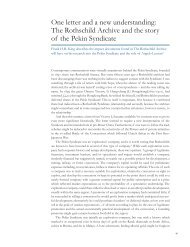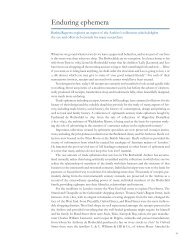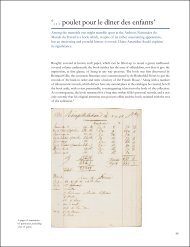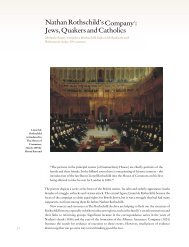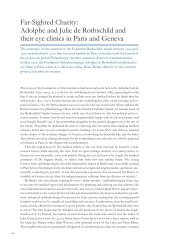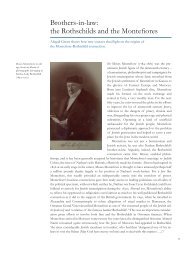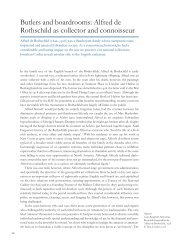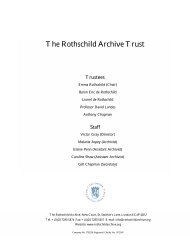66900 Rothschild Archive - The Rothschild Archive.
66900 Rothschild Archive - The Rothschild Archive.
66900 Rothschild Archive - The Rothschild Archive.
Create successful ePaper yourself
Turn your PDF publications into a flip-book with our unique Google optimized e-Paper software.
Receipt from the Bank of<br />
Alexandria for money sent<br />
by N.M. <strong>Rothschild</strong> & Sons<br />
for the account of the<br />
Egyptian Government,<br />
20 December 1875.<br />
<strong>Rothschild</strong> frères shared the information which they received from E. Bouteron, the French<br />
commissioner for the state domains, and from their agent and lawyer in Egypt, respectively J.R.<br />
Lorent and G. Coulon. Another perspective on the situation came from the correspondence<br />
encouraged from Ambroise Sinadino of the Banque Générale d’Egypte in Alexandria. <strong>The</strong> files<br />
also contain official reports and sets of accounts from the commissioners.⁴<br />
From the evidence of his correspondence, Rowsell began his commission with enthusiasm<br />
and optimism, convinced that good administration would be able to transform the domains<br />
into an efficient and profitable operation. <strong>The</strong> frustrations of his attempts to understand, let<br />
alone change, an alien system are also apparent. Nevertheless, one of his first letters, although<br />
dominated by a description of how manpower from the domains was being conscripted for<br />
public works despite previous assurances of its exemption, concludes on an almost joyful note:<br />
<strong>The</strong> climate here is still lovely and delicious, making the fact of being alive a pleasure<br />
in itself.⁵<br />
Rowsell seems to have been an observant man, sensitive to his environment and the people<br />
around him. Early on in his letters he begins to use French, Turkish and Arabic expressions and<br />
indeed at one point he speculates on whether or not he should begin wearing the fez.<br />
Rowsell and the domains were beset by problems: a complete absence of maps or plans of<br />
the estates, no trace of account keeping from previous administrators, labour conscription, disputed<br />
mortgages, machinery in poor condition, unexpected taxes, ₆ falling crop prices. Far from<br />
being a source of profit the domains turned out to require so much investment that the commissioners<br />
had first to borrow money to keep them in business. When there was an occasion,<br />
in 1881, that the domains produced a ‘surplus’ beyond the immediate requirements of the next<br />
interest payment the bank had to call in a barrister to advise them as to whether the surplus<br />
could be treated as working capital rather than passed straight into the service of the loan.<br />
More and more frequently the Egyptian government had to make up a shortfall in the dividend<br />
payments, leading to direct criticism of the domains administration. Edgar Vincent, representative<br />
of the Egyptian government at the conference of Berlin, wrote that: ‘the greatest<br />
danger to Egyptian finance comes from the Domains Administration’ and that the lands would<br />
be better ‘in the hands of the fellaheen, from whom they were taken by Ismail Pasha’.⁷ Rowsell<br />
himself would no doubt have supported this latter sentiment. In 1884 he went to Vienna in an<br />
attempt to get the domain loan renegotiated and the mortgage lifted.<br />
36




